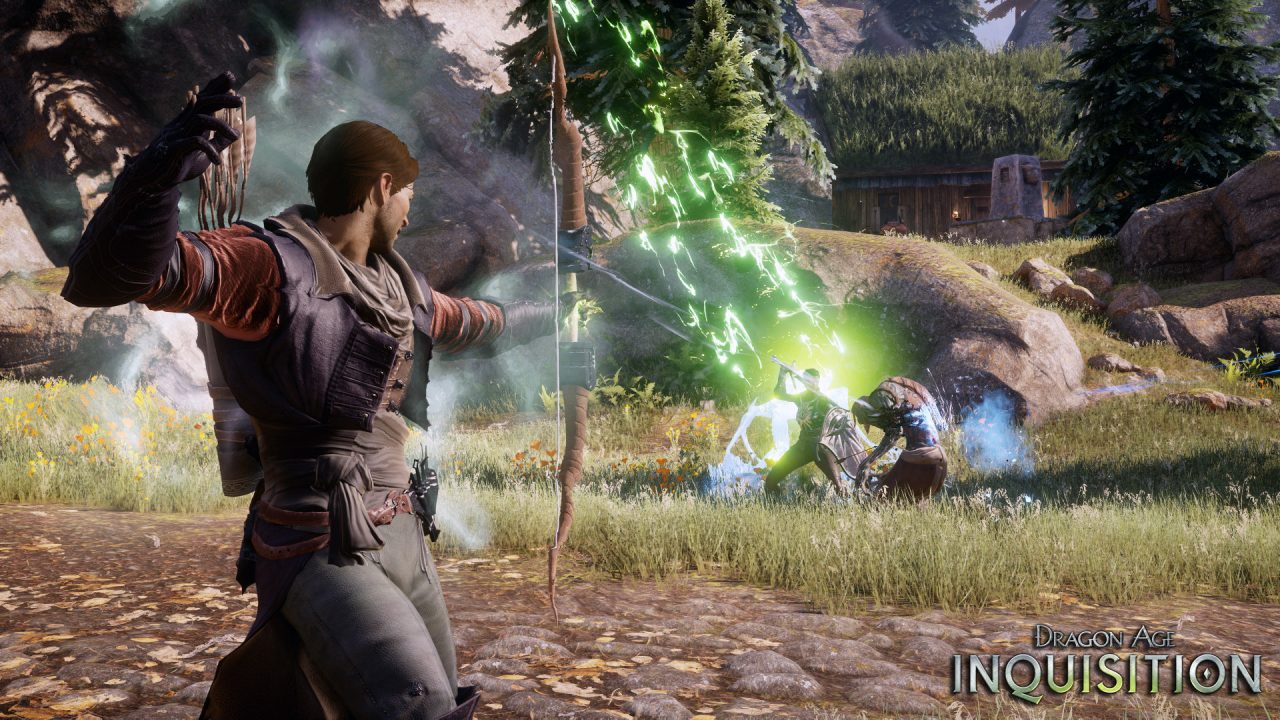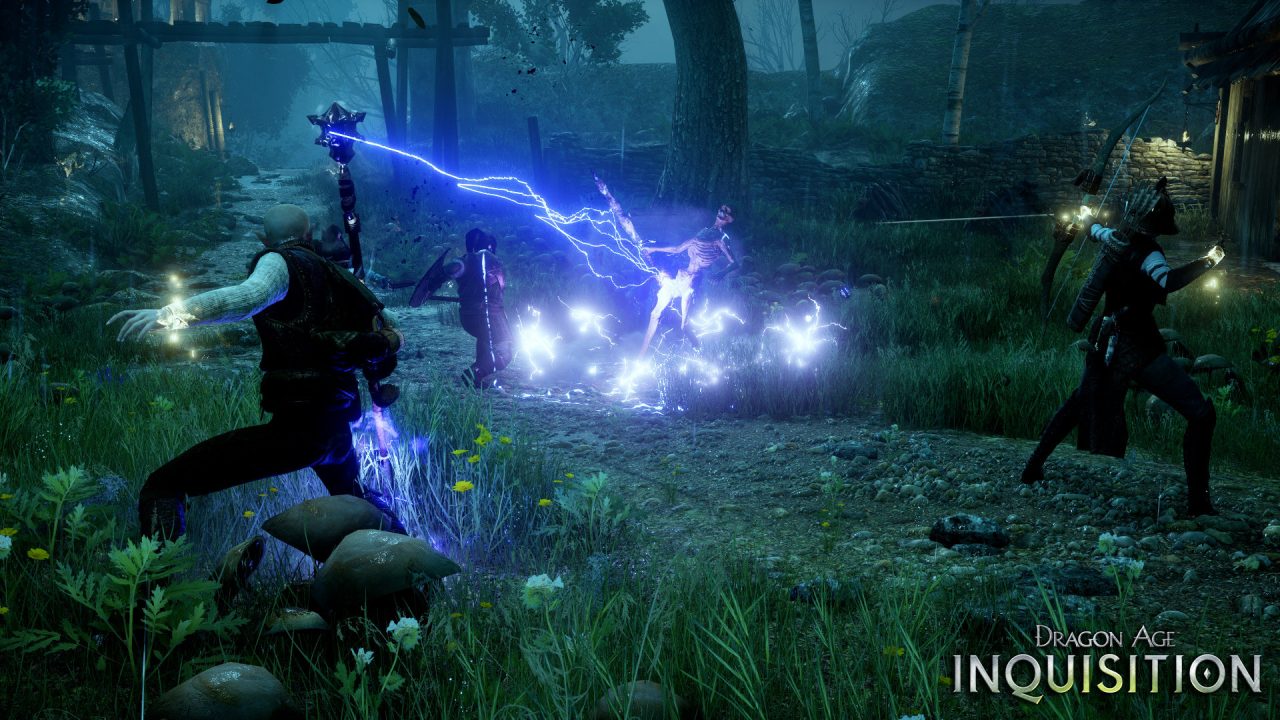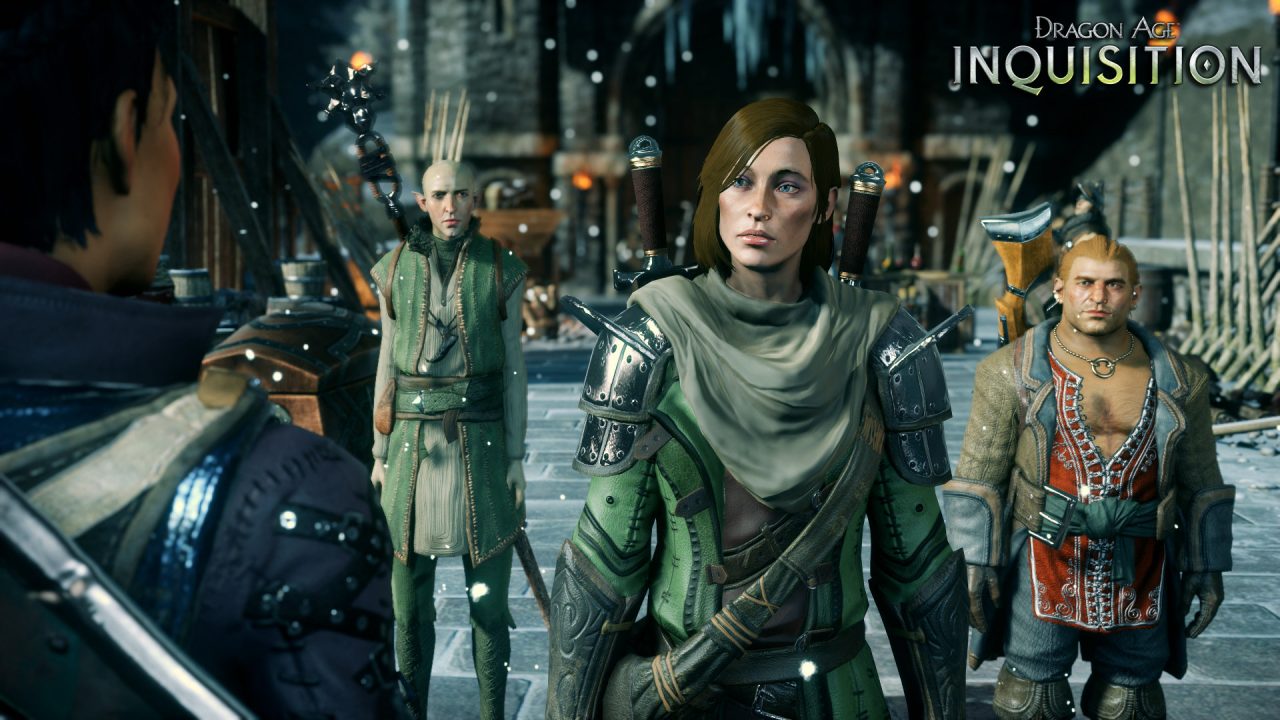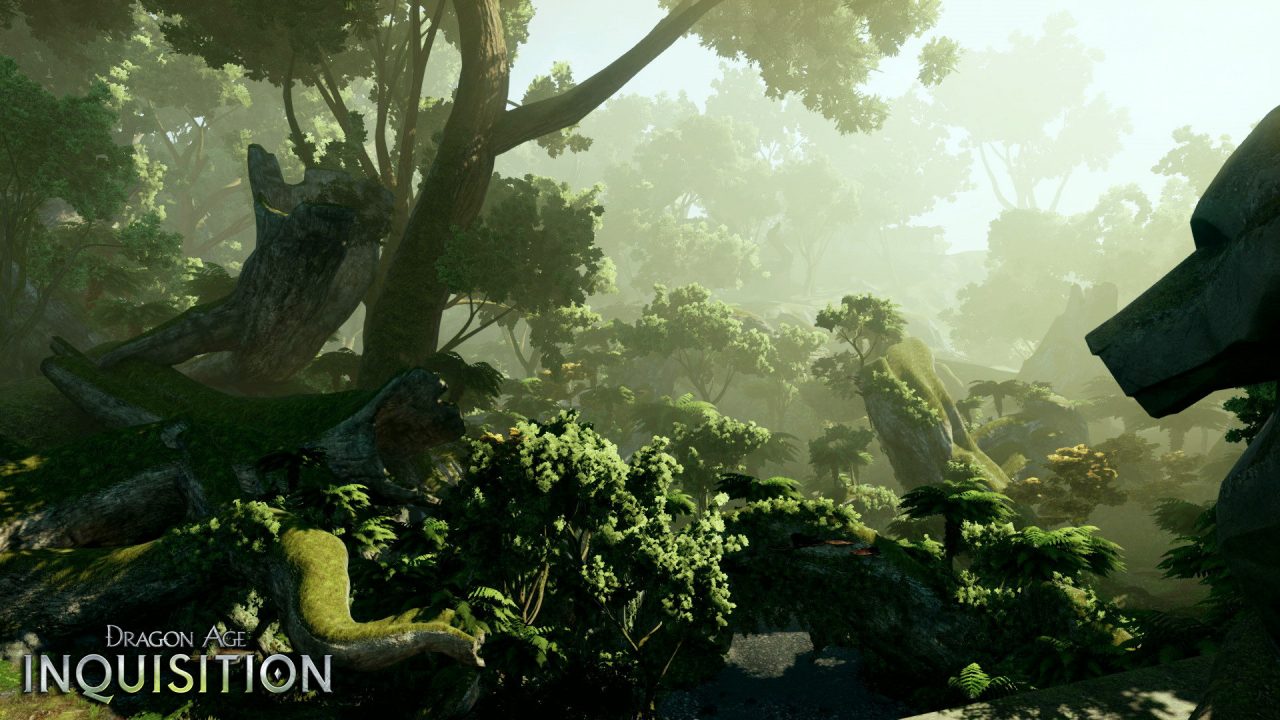Audra Bowling
I still have fond memories of my first Dragon Age: Inquisition playthrough, so I was thrilled when the opportunity to revisit the game right before the looming release date for Dragon Age: The Veilguard presented itself. I’ll always have a nostalgic soft spot for BioWare games, and I am pleasantly surprised to find that DAI still holds up incredibly well.
For my second foray into DAI, I shook things up from my typical DA playthrough traditions by choosing to be a warrior instead of a mage or rogue, eventually specializing in the potent Reaver class. I opted to go for a Dalish Elf Origin even though I’ve always personally been more partial to the City Elves in DA lore. I also actively tried to befriend all of the characters I could. I even decided to go for the tragic Solas romance to see how it permeated the engrossing Trespasser epilogue DLC, despite my preference of happy/hopeful love stories.
I don’t regret these decisions, finding myself rewarded with a thoroughly satisfying playthrough. This time around I managed to encounter a bevy of new scenarios and dialogues that helped strengthen my opinions on characters such as Sera and Blackwall, with my Inquisitor even becoming an honorary Red Jenny! I feel confident with carrying over this particular version of my DAI forays into the fourth game’s lore. Thedas is a fascinating and compelling fantasy world with plenty of memorable characters, and the Inquisition’s wide-spanning quest continues to have considerable reach.
Paul Dennis
This was my first Dragon Age game, though not my first playthrough. I bounced off of Origins when it came out, and never gave the sequel a shot. I struggled with this one too, but the moment I learned about the relationship between the mages and templars in the Hinterlands was kind of a soft click for me. The mages are gun control and civil rights, the templars are cops with substance use disorders. These are familiar issues which many people have formed strong opinions about in the real world, but in Thedas, they’re combined in unexpected ways that I find incredibly thought provoking. I was hooked.
The moment that truly defined my first playthrough of this game was the conclusion of In Your Heart Shall Burn, the mission where Haven, the headquarters of the Inquisition up until this point, is besieged and eventually destroyed. I fell into the Hinterlands trap, so I had a lot of hours by then, and I think that made this mission feel even more emotional. This didn’t feel early to me. I’d put in a lot of work, and now my home was gone.
I wasn’t sure how the Inquisition would recover, and the ensuing trek through the Frostbacks feels much longer in my memory than it felt in any of the nearly ten playthroughs I’ve done since. I felt hopelessness, despair, uncertainty, but above all, I felt lost. It was familiar to me. In nearly every Suikoden game, there’s a moment when you’re on the run, feeling all of those emotions, and then you find your true home, a place where you dig your heels in and turn the tide. Discovering Skyhold felt exactly like that, and since Suikoden is my favorite series, I couldn’t help but fall in love. That was when I knew Dragon Age was for me.
For this playthrough, I chose an elf archer, focused on masterwork equipment with the Hidden Blades effect, and chose Assassin as my specialization to unlock Hidden Blades as an ability. I rolled with a lot of warriors, but found myself enjoying a party of Solas, Cole, and Cassandra. Their individual backgrounds inspire a lot of fascinating banter. Seeing Solas counsel Cole on how to understand his unique nature along with Cole helping Cassandra to understand the severity of templar negligence and corruption are two of my favorite examples of how party interactions make the grind more interesting. I even installed a mod to make it happen more often.
I often play RPGs because I have this quiet, internal need to be the hero. This series scratches that itch while making sure I touch grass occasionally by asking the hard questions, forcing me to make tough decisions and covering many poignant real-world issues. I think Dragon Age is the most compelling and unique western RPG series out there, and I think Inquisition in many ways is the best entry in the series. Needless to say, I was all too happy to immerse myself in the universe again and I’m incredibly excited for the sequel. October 31st can’t come soon enough.
Wes Iliff
Bioware earned my loyalty with Knights of the Old Republic, and I’ve played nearly every release since. Often, I’d end up with something amazing like Mass Effect. Sometimes I’d pull the short straw, as with Sonic Chronicles. But nothing hits quite like the Dragon Age series. From the best-in-breed roleplaying of Origins to the troubled innovation of Dragon Age II, the series seems willing to reinvent itself at every moment while keeping core values at the fore. But Inquisition might be, to date, their most fully realized vision.
At bare minimum, it’s a universal improvement from the second outing, but it also evolves the series in many ways from the original. The roleplaying isn’t quite as strong as Origins, but it’s still plenty robust. Your race, class, and choices all feed into how things will play out as you continue the game. Combat is a treat. The world is fleshed out more than ever before. And that’s not including the things it does that are wholly unique, like the war table, customizing your castle, and passing judgment on villains throughout.
Replaying Inquisition has me more excited for Veilguard than ever before. I forgot how amazing this game felt to play, how dense with mystery this world is. I was reminded of my favorite characters, and I found myself missing those who did not appear. I want to see how the events promised at the end of the game play out.
But, perhaps most importantly, I want to play Inquisition all over again. Trying new backgrounds, new classes, new romances, and new parties can pull you through these games over and over again. I had a blast playing through the entire trilogy as a mage for the first time. I loved learning more about companions I had focused on less in the past. Inquisition is a satisfying evolution on the promises of the rest of the series, and I cannot wait to see what comes next.
They ain’t never gonna beat Skyhold as a base, though.
Aleks Franiczek
I’ve played through all three entries of the Dragon Age trilogy for the first time this past year for Retro Encounter and enjoyed them all for their own merits. I was no stranger to BioWare games beforehand and assumed these would largely feature the same charms and faults in other titles. While that’s not completely untrue, it’s certainly a reduction of what these games manage to accomplish individually, and more importantly, collectively. The Mass Effect Trilogy is fairly regarded as a singular RPG experience because of the continuity it carries forward with a single player character across three full games—along with the friends and choices they make along the way.
The Dragon Age trilogy works differently but is no less involving. Across three games with their own aesthetics, mechanics, narrative structures, and player characters, we get to see the mythology and politics of Thedas unfold before us in a way that transcends any heroic individuals. If Mass Effect is about the progression of a character, Dragon Age is about the progression of a world. Inquisition knew it was the culmination of that continuity (at the time, at least) and made all the right calls where it mattered most to make it feel climactic and impactful.
For the first time, Thedas isn’t represented as the series of corridors we see in Dragon Age: Origins or the concentrated pocket of political intrigue we got in Dragon Age II’s Kirkwall. We get to explore geographically rich open-world zones with events unfolding within them while discovering lore informing their history. Sure, there’s a bunch of busywork in there that threatens tedium to any unassuming completionist, but it’s easy to ignore. There’s enough going on with the distinct and elaborate main quests, satisfying exploration, and personally involving companion relationships to fulfill all the progression and leveling requirements necessary for a satisfying playthrough. I still ended up doing more side content than I intended just because I was having such a good time, and even after 100 hours part of me wants to jump in for another playthrough with a different world-state and make different choices. That’s a sign of a quality RPG.
Michael Sollosi
Dragon Age: Inquisition isn’t as well-paced as the first Dragon Age or as intimate as the second, but it meaningfully expands and elaborates on the high-dark fantasy setting introduced five years earlier, and is by far the most ambitious game in the series. Rarely have I encountered a game with this sheer volume of content that also maintains such a high standard of writing and player engagement.
Dragon Age: Inquisition‘s combat and exploration takes place across ten large zones (twelve counting DLC) that are each dense with characters, quests, items, and foes to encounter. At your home base, you can interact with teammates and discover more about your organization’s members, and also engage in “war table missions” that affect the Inquisition’s power and influence, allowing for more progress in the active gameplay theatres of the game. These regions are so beautiful and the characters are so affable that almost none of it feels like time wasted.
By balancing the game’s active components (fighting, discovering, and negotiating) with more passive base activities (planning out missions and spending time with companions), Dragon Age: Inquisition combines western RPG with a management sim in ways unsurpassed this side of Like a Dragon. I know that The Veilguard will feel very different from Inquisition when it launches in a few months, but my hype couldn’t be any higher for this ever-evolving series. (Just don’t kill Varric. Please.)








